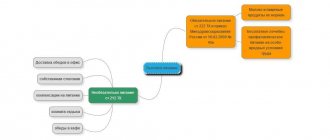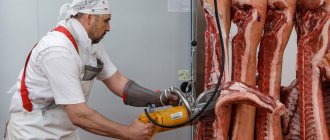Bakers ensure the uninterrupted and correct operation of the equipment in which bakery products are prepared. They interact with raw materials and put them into ovens. Bakers must have precise knowledge of baking temperatures and techniques. Equally important is compliance with safety precautions when using complex equipment. The baker's job description provides information about what other requirements enterprises have for such employees.
FILES
Baker job description sample
General provisions
1.1. This instruction regulates the following aspects of a baker’s professional activity: job tasks, working conditions, rights, duties and areas of responsibility. 1.2. The hiring and subsequent dismissal of a baker is carried out by issuing an appropriate order on behalf of the general director/owner of the company. This procedure is regulated by Russian labor legislation. 1.3. The status of the baker's immediate superior is the production manager. 1.4. In the absence of a baker at his work position (due to illness, vacation or other reasons), his powers are transferred to an employee with the appropriate level of knowledge, work experience and area of competence. The appointment of a deputy is made in accordance with the procedures adopted by the company. 1.5. The following set of requirements is presented to the applicant for the position of baker:
- secondary specialized/general education;
- special training in the production of bakery products.
1.6. The baker must be familiar with:
- technological aspects of manufacturing bakery products;
- temperature settings for baking dough and methods for placing blanks on sheets;
- methods of analyzing the degree of readiness of preparations for baking and the quality of finished products;
- options for adjusting the baking time of bakery and flour-confectionery products and caring for the baking chamber (using timely moistening);
- factors that influence the yield of bread, and methods of their calculations;
- technical characteristics of the furnace and its performance coefficients;
- requirements and state standards that apply to bakery and flour and confectionery products;
- structure, design features and control procedures for kitchen equipment.
1.7. In his professional activities, a baker is guided by:
- rules for the use of personal protective equipment;
- requirements for the quality of finished products and for optimizing the production process in workplaces;
- types of marriage and methods of its prevention and elimination;
- Russian legislation;
- internal regulations of the enterprise;
- orders issued on behalf of the general director of the enterprise;
- this instruction.
Job responsibilities
2.1. The job responsibilities of a baker include the following tasks:
- preparation of recipes for bakery products;
- control of the stages of scalding and baking of lamb products, which occurs on lines that are equipped with proofing and oven mechanisms;
- greasing the hearths of bakery cradles, placing dough pieces on the hearths;
- controlling the steam level and temperature in the baking chamber;
- adjusting the speed of movement of furnace conveyors;
- molding of bakery products;
- drying crackers in specialized ovens;
- removing cooked products from ovens and chambers;
- adjustment of the mechanisms that are responsible for planting, picking and moistening the grains;
- moving products into containers;
- working with the dough dividing mechanism and controlling the proofing processes - in the process of planting dough pieces into equipment for preparing rye varieties of bread;
- preparing flour for kneading dough - with a small amount of work and free time;
- eliminating damaged workpieces and moving quality products to trays;
- care of serviced equipment - cleaning, disinfection, acceptance and delivery;
- keeping the workplace and tools assigned to the baker clean.
2.2. For bakers working in production facilities equipped with electric ovens, the tasks are supplemented by the following points:
- placing dough pieces on sheets and then cutting them manually;
- rolling up the trolleys, placing the sheets in the baking chamber and then removing them.
2.3. The management of the enterprise has the right to involve the baker in the implementation of professional obligations overtime - within the framework provided for by the Russian Labor Code.
Rights
3.1. The powers assigned to the baker include the following:
- familiarization with the projects of the management of the enterprise that affect the professional activities of the employee;
- notifying the immediate supervisor about violations discovered during the work process in the organization’s production activities and expressing initiatives to prevent them;
- requesting from the management of the enterprise or authorized specialists documents that the employee requires to carry out his work tasks (on personal initiative or by order of his immediate superior);
- involvement of employees of other departments of the enterprise to solve the tasks assigned to the employee (if this item is provided for by the regulations on the company’s divisions);
- a requirement from the management of the organization to create working conditions required for the correct performance of professional duties.
Responsibility
4.1. Among the actions for which a baker can be punished are the following:
- incorrect performance or refusal to perform one’s direct duties, which are listed in this instruction - within the framework of Russian labor legislation;
- misuse of official powers/use of powers for personal gain;
- providing false information about the status of the assigned scope of work;
- refusal to take measures to promptly eliminate violations of safety regulations and other rules, which creates a threat to the organization’s activities and the lives of employees;
- causing material damage to an enterprise through abuse of one’s powers.
General provisions, functions and tasks of the confectioner
The “General Provisions” section includes the following information:
Subscribe to our newsletter
Read us on Yandex.Zen Read us on Telegram
- the name of the position and place of work of the employee in accordance with the staffing schedule adopted at the enterprise;
- the procedure for appointing an employee and dismissing him from office;
- qualification requirements for candidates for the position;
- procedure for replacing a confectioner in the event of his absence;
- a description of the skills and abilities that the employee must have;
- a list of regulations and local acts, the provisions of which can guide the confectioner in his activities.
The section of the instructions “Functions and Tasks” includes an indication of the main type of activity of the confectioner, which is established depending on the type of enterprise - the place of work and the number of confectioners among whom the cooking responsibilities are shared. For example, if a worker's task is to make baked goods, the function might include, for example, learning the process of making them.
Job description structure
The job description does not have a unified format. The compilers include certain items in it, based on the focus of a particular organization. The absence of an approved sample does not exclude the standard format of this document. It consists of the following sections:
- "General provisions";
- "Job Responsibilities";
- "Rights";
- "Responsibility".
Some positions are duplicated in production. For example, a company may have several bakers or several production managers. In such situations, the preparation of job descriptions depends on the specifics of the activities of each employee. If the functions, rights and responsibilities of all bakers are the same, then the instructions issued to them are no different. However, if employees are responsible for different production areas, then these features should be reflected in each instruction.
Reference! Possible additional sections include working conditions and the procedure for interaction with other structural units.
General provisions
General provisions provide the employee with basic information about his position. This section addresses issues of subordination, hiring and firing, qualifications and other general issues. The general topics that should be covered include the following:
- the category to which the position of baker belongs;
- the order on the basis of which the employee was added to the staff;
- the immediate supervisor, who monitors the employee’s compliance with his direct duties;
- the qualification “minimum” that an applicant must have to obtain a position (if there are different options for requirements, all possible ones are indicated);
- regulations that affect both the legislative sphere and regulations within a particular organization;
- the procedure for maintaining records (if the position involves the preparation of such documents);
- basic safety precautions that apply to the production in which the employee will work.
Job responsibilities
The section called “Job Responsibilities” lists all the functions that are assigned to a baker. These functions may vary from organization to organization. For example, the job responsibilities of a second-class baker differ from those of a third-class baker. The functionality also depends on the specifics of the equipment. Bakers who have the skills to operate electric ovens have new items added to their list of responsibilities.
Rights
Rights include all those actions that the baker can perform voluntarily. As a rule, they are associated with taking the initiative to optimize the work process. The list of rights that are assigned to the baker covers the following issues:
- requirement of proper working conditions;
- participation in meetings that affect the employee’s job responsibilities;
- attracting employees from other departments if required to solve the task;
- making proposals to improve the work process.
Reference! The rights of bakers may vary depending on their rank.
Responsibility
Liability covers all misconduct by the baker that results in damage to the organization. The punishment for the actions committed depends on the severity of the consequences. For minor offenses, the baker may be reprimanded or deducted from his salary. Misdemeanors that cause great damage lead to dismissal and even imprisonment.
Actions that will subject a baker to disciplinary action include the following:
- negligent attitude to work: damage to equipment, leaving dirt in the workplace, incorrect kneading of dough, etc.;
- endangering your colleagues and the enterprise as a whole due to non-compliance with safety regulations;
- systematic violation of internal regulations;
- causing material damage to the organization.
Reference! All punishments that management applies to an employee must be within the framework of Russian labor legislation.
Rights, responsibilities and mode of operation of a confectioner
The “Rights” section includes a list of employee rights with which he is endowed for the proper performance of his duties. The confectioner has the right:
- refuse to use expired products for the manufacture of confectionery products;
- require relevant specialists to organize the operation of refrigeration and other equipment in the event of a breakdown;
- contact your boss with proposals for improving the process;
- interact with other services and other structural divisions, etc.
The “Responsibility” section of the job description can be presented in one of 3 options:
- Listing specific actions for which liability may arise. For example, it may be said that “failure to comply with the terms of the employment contract and the provisions of this document entails the application of disciplinary measures.”
- Indicating the types of responsibility to which the employee is involved. As a rule, we are talking about material (in case of damage to the employer’s property), disciplinary (in case of failure to perform or improper performance of duties), criminal (in case of committing a crime) and administrative (in case of committing an administrative offense).
- Referring to the norms of current legislation. In this case, formulations such as “the employee is responsible in accordance with the law” are used.
The “Working hours” section provides clarifications regarding the specifics of the confectioner’s work schedule, if any. In this case, we can talk about night shifts, duty, irregular working hours, etc.
Occupational Safety and Health
2.4.
skills - 2.5. additional requirements For a baker of the 4th category
- Documents regulating the activities of a baker
3.1 External documents: Legislative and regulatory acts relating to the work performed. 3.2 Internal documents: Charter of the enterprise, Orders and instructions of the director of the enterprise (head of the catering establishment); Regulations on the catering establishment, Job description of the baker, Internal labor regulations.
- Job responsibilities of a baker
4.1. Carries out the process of baking and frying confectionery and bakery products. 4.2. Places dough pieces on sheets, in cassettes, and forms.
4.6. Controls temperature
What should a pastry chef be able to do?
A pastry chef must be able to make a wide variety of doughs, fillings, jellies and creams. He must know the technologies and rules of baking, as well as the technique of decorating products. Must be able to determine the quality of raw ingredients and prepare high-quality products from them. The confectioner does all this not only manually, but also with the help of special confectionery equipment. Equipment for confectioners helps bring culinary ideas to life and greatly facilitates the work of preparing a particular dessert. Dough mixers and cream beaters, waffle irons, molding machines - all this allows you to reduce manual labor to a minimum and increase production volumes.
The responsibilities of a pastry chef vary depending on his category and the location where he works. At enterprises, a specialist is responsible for each stage of the technological process: one kneads the dough, another is engaged in decoration, - or - one is responsible for baking, and the other is responsible for preparing the final product, etc.
A high-level confectioner is engaged in the production, and in some cases - only control of the process of production of original, difficult to execute, highly artistic cakes and pastries. He forms dough pieces of complex shapes, assembles patterns on confectionery products from parts, develops innovative recipes and confectionery production technologies.
Qualification requirements for a baker
Bakers must have a secondary vocational education that allows them to operate baking equipment. This equipment includes ovens and dough separators, additional devices.
In addition, the requirements for a baker include knowledge and skills in classifying, selecting and processing dough. Professionals in this field must have sufficient physical endurance, have neatness and dexterity, they are characterized by diligence, observation and a developed eye. Specific skills include taste memory and creative thinking.
Qualities Required to Be a Baker
To begin with, I would like to note that the baker must be healthy, both physically and mentally. And also have the following qualities:
- Physical endurance
- Attention to detail
- Logical thinking (baking art is, in a sense, an exact science)
- Responsible attitude and integrity
- Dexterity
- Developed fine motor skills
- Patience
- Developed sense of smell and touch
- A desire to learn (learning to bake is an ongoing process)
Responsibilities
2.1. Before the start of the working day (shift), the master baker:
1) gets acquainted with the procedure for performing work, clarifies with the immediate supervisor the features of the organization of the working day (regular day, special services, etc.);
2) puts on special clothes, shoes, and puts his hair in proper condition;
3) receives the necessary supplies (equipment, devices, etc.);
4) draws up applications for products and semi-finished products;
5) receives the necessary food raw materials and semi-finished products from the pantry;
6) prepares the necessary equipment, devices, checks their serviceability;
2.2. During the work process, the master baker:
1) performs the work for which he has been instructed and authorized;
2) uses special clothing, safety shoes, and other personal protective equipment;
3) receives instructions from the immediate supervisor on the performance of the task, safe techniques and methods of performing work;
4) complies with the rules for using devices and tools, methods and techniques for performing work safely;
5) immediately notify the immediate supervisor of all deficiencies discovered during work;
6) complies with sanitation requirements, rules of personal hygiene and workplace hygiene;
2.3. During the working day (shift), the master baker:
2.3.1. 4th category:
1) conducts the technological process for the production of bakery products
with production per shift ______________________________________________________________
(over 3 to 7 tons of bread/up to 5 tons of mixed assortment
bakery products/up to 2 tons of bakery products/up to 700 kg of crackers or
lamb products/up to 400 kg of gingerbread products)
2) monitors the operation of the equipment of mechanized and automated lines of the serviced area;
3) monitors compliance with the planned output of finished products, the fulfillment by the serviced area of the task for the quantity, assortment and quality of products at all stages of production according to the readings of instrumentation, analysis results and the organoleptic assessment method;
4) takes measures to prevent and eliminate the causes of deviations from the norms of the technological regime, eliminate malfunctions in the operation of the equipment being serviced;
5) calculates the amount of raw materials needed and the output of finished products;
6) accepts and delivers raw materials, semi-finished products and finished products;
2.3.2. 5th category:
1) conducts the technological process for the production of bakery products
(with production per shift of over 7 tons of bread/over 5 tons of mixed assortment
bakery products/over 2 tons of bakery products/over 700 kg of crackers or
lamb products/over 400 kg of gingerbread products;
when conducting the technological process for the production of bakery products
at enterprises equipped with tender furnaces and tornadoes, regardless
on their performance)
2.3.3. 6th category:
1) conducts the technological process for the production of bakery products at enterprises equipped with installations for bulk storage of raw materials, dough preparation units and continuous installations, complex mechanized lines, tunnel ovens, when producing small-piece confectionery products over 1.5 tons per shift with an expanded assortment of over 10 names;
2.4. At the end of the working day (shift), the master baker:
1) prepares the workplace, tools, equipment for the next
2) ________________ storage of unused raw materials, semi-finished products,
unsold finished products;
3) removes special clothing and shoes and places them in storage;
4) submits established reports;
2.5. The master baker is obliged to inform ___________________________________
about an increase in temperature during the working day, the appearance of signs
gastrointestinal and other infectious diseases, suppurations, cuts,
burns, as well as all cases of intestinal infections.
Bakery bakery
accepted for a position and released from it by order of the head of the enterprise.1.4.
In his practical activities, a baker of bakery products is guided by: - this job description; - orders of the manager (owner) of the enterprise. 1.5. is subordinate to ________________.1.6. During the absence of a baker of bakery products (vacation, illness, etc.), his duties are assigned to a person appointed in the prescribed manner. 1.7.
must know: - the purpose of devices and equipment used in practical work, and the rules for their maintenance; - norms and rules of labor protection; - technology for the production of bakery products; - sanitation and personal hygiene rules; - material consumption standards; - recipes for bakery products; - rules internal labor regulations; - fire protection rules. 2.
Benefits of being a baker
The baker's profession is well-respected and brings good income. As employment market statistics show, such a specialist has a better chance of receiving a job offer than an accountant. Of course, everything depends on the country, company and professionalism of the applicant. That is why one of the main advantages of the baker’s profession is its demand.
In addition, such a specialist has room to develop, both horizontally and vertically. For example, he can master new techniques, start working with other products, take courses in confectionery art, or get a promotion and become a technologist, production manager, or he can retrain and become a chef.
According to the rules, bakers undergo regular medical examinations (once a year or six months), which allows them to maintain normal health and take timely measures to treat diseases. A significant advantage, isn't it?
And finally, a baker who loves his job will delight his family and friends with baked goods, and the home kitchen can become a place for experimentation and creativity.







